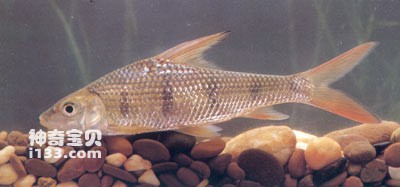Tor (Parator) zonatus belongs to the order Cypriniformes, family Cyprinidae, subfamily Tor (Parator) zonatus, and genus Tor (Parator) zonatus. Commonly known as: Wujian dace, red-tailed dace, and high dace. English name: Trilobed-lip barbel.
Endangerment level: Vulnerable.
The body is long and flat on the sides, the back is raised, the ventral surface is flat, and the tail stalk is thin. big head. The kiss is slightly pointed. The anterior edge of the anterior orbital bone is notched and cracked. The lower part of the mouth is in the shape of a horseshoe. The lips are thick and close to the surface of the jaw, and the upper lip is unlobed; the lower lip is obviously rolled downward, with a well-developed tongue-shaped middle leaf on the chin, the back end is curled slightly to a point, and the end exceeds the corner of the mouth; the upper and lower lips are connected at the corner of the mouth. There are 2 pairs of barbels, the muzzle barbels are thin and the mouth barbels are long. Lateral line scales 44-50. The dorsal fin spines are thick and serrated, with a barb lying forward; the anal fin is long, extending back to the base of the caudal fin; the caudal fin is deeply bifurcated. The body is light olive in color, with black edges on the scales on the back. There are 5 vertical stripes on the side of the body with large black spots in between. The end of the dorsal fin membrane is slightly black, and the tail and anal fins are orange-red.
It is a fish in the middle and lower layers of rivers. It inhabits the rocky deep water bottom and especially likes to live in clear rapids. A good swimmer and often active in groups. Feed on benthic animals. Growth rate is faster. Generally, they reach sexual maturity in 3 winters and lay eggs on rapids beaches in spring from March to April.
The leaf knot fish is distributed in the trunk and tributaries of the Xijiang River system.
Due to overfishing, changes in the ecological environment, deterioration of water quality and other reasons, the normal life and reproduction of fish have been greatly affected, and their resources have been significantly reduced. At present, there are still a certain number of individuals in the Xijiang River system, but the number of individuals has decreased significantly compared with the past.

animal tags:
We created this article in conjunction with AI technology, then made sure it was fact-checked and edited by a Animals Top editor.